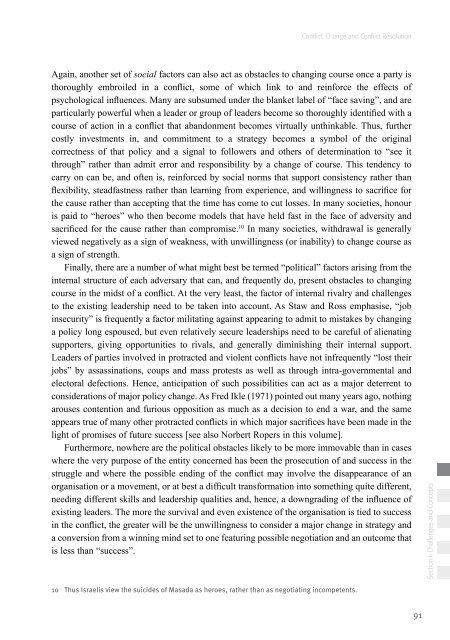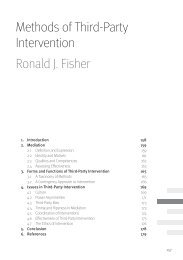Conflict, Change and Conflict Resolution - Berghof Handbook for ...
Conflict, Change and Conflict Resolution - Berghof Handbook for ...
Conflict, Change and Conflict Resolution - Berghof Handbook for ...
Create successful ePaper yourself
Turn your PDF publications into a flip-book with our unique Google optimized e-Paper software.
<strong>Conflict</strong>, <strong>Change</strong> <strong>and</strong> <strong>Conflict</strong> <strong>Resolution</strong><br />
Again, another set of social factors can also act as obstacles to changing course once a party is<br />
thoroughly embroiled in a conflict, some of which link to <strong>and</strong> rein<strong>for</strong>ce the effects of<br />
psychological influences. Many are subsumed under the blanket label of “face saving”, <strong>and</strong> are<br />
particularly powerful when a leader or group of leaders become so thoroughly identified with a<br />
course of action in a conflict that ab<strong>and</strong>onment becomes virtually unthinkable. Thus, further<br />
costly investments in, <strong>and</strong> commitment to a strategy becomes a symbol of the original<br />
correctness of that policy <strong>and</strong> a signal to followers <strong>and</strong> others of determination to “see it<br />
through” rather than admit error <strong>and</strong> responsibility by a change of course. This tendency to<br />
carry on can be, <strong>and</strong> often is, rein<strong>for</strong>ced by social norms that support consistency rather than<br />
flexibility, steadfastness rather than learning from experience, <strong>and</strong> willingness to sacrifice <strong>for</strong><br />
the cause rather than accepting that the time has come to cut losses. In many societies, honour<br />
is paid to “heroes” who then become models that have held fast in the face of adversity <strong>and</strong><br />
sacrificed <strong>for</strong> the cause rather than compromise. 10 In many societies, withdrawal is generally<br />
viewed negatively as a sign of weakness, with unwillingness (or inability) to change course as<br />
a sign of strength.<br />
Finally, there are a number of what might best be termed “political” factors arising from the<br />
internal structure of each adversary that can, <strong>and</strong> frequently do, present obstacles to changing<br />
course in the midst of a conflict. At the very least, the factor of internal rivalry <strong>and</strong> challenges<br />
to the existing leadership need to be taken into account. As Staw <strong>and</strong> Ross emphasise, “job<br />
insecurity” is frequently a factor militating against appearing to admit to mistakes by changing<br />
a policy long espoused, but even relatively secure leaderships need to be careful of alienating<br />
supporters, giving opportunities to rivals, <strong>and</strong> generally diminishing their internal support.<br />
Leaders of parties involved in protracted <strong>and</strong> violent conflicts have not infrequently “lost their<br />
jobs” by assassinations, coups <strong>and</strong> mass protests as well as through intra-governmental <strong>and</strong><br />
electoral defections. Hence, anticipation of such possibilities can act as a major deterrent to<br />
considerations of major policy change. As Fred Ikle (1971) pointed out many years ago, nothing<br />
arouses contention <strong>and</strong> furious opposition as much as a decision to end a war, <strong>and</strong> the same<br />
appears true of many other protracted conflicts in which major sacrifices have been made in the<br />
light of promises of future success [see also Norbert Ropers in this volume].<br />
Furthermore, nowhere are the political obstacles likely to be more immovable than in cases<br />
where the very purpose of the entity concerned has been the prosecution of <strong>and</strong> success in the<br />
struggle <strong>and</strong> where the possible ending of the conflict may involve the disappearance of an<br />
organisation or a movement, or at best a difficult trans<strong>for</strong>mation into something quite different,<br />
needing different skills <strong>and</strong> leadership qualities <strong>and</strong>, hence, a downgrading of the influence of<br />
existing leaders. The more the survival <strong>and</strong> even existence of the organisation is tied to success<br />
in the conflict, the greater will be the unwillingness to consider a major change in strategy <strong>and</strong><br />
a conversion from a winning mind set to one featuring possible negotiation <strong>and</strong> an outcome that<br />
is less than “success”.<br />
10 Thus Israelis view the suicides of Masada as heroes, rather than as negotiating incompetents.<br />
91<br />
Section I: Challenges <strong>and</strong> Concepts
















